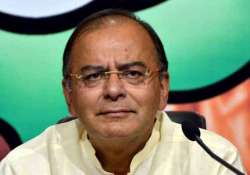India won't resort to burden of retrospective tax: Jaitley
New Delhi: Finance Minister Arun Jaitley Friday said India will not levy any tax with retrospective effect that creates additional burden and existing anomalies in this regard would be corrected. “One thing we have made very

New Delhi: Finance Minister Arun Jaitley Friday said India will not levy any tax with retrospective effect that creates additional burden and existing anomalies in this regard would be corrected.
“One thing we have made very clear: No retrospective tax creating fresh liabilities will be imposed,” Jaitley told the Lok Sabha, the lower house of parliament, in his reply to the debate on the national budget for the current fiscal.
He blamed the previous United Progressive Alliance (UPA) government of creating such an anomaly and said the National Democratic Alliance (NDA) government under Prime Minister Narendra Modi was trying to rectify it.
“Retrospective tax was created by you. This mess of tax terrorism was yours and we are trying to bring civility back by clearing it,” said the finance minister, referring to the capital gains tax of 2012 that was imposed with effect from 2007.
Retrospective taxation has evoked much criticism from domestic and overseas investors, notably Britain-based global telecom major Vodafone. In his budget speech earlier this month, Jaitley had assured that India will not resort to it randomly.
“The sovereign right of the government to undertake any retrospective legislation is unquestionable,” the finance minister had said during the course of his two-hour-long budget speech.
“However, this power has to be exercised with extreme caution and judiciousness, keeping in mind the impact of each such measure on the economy and the overall investment climate,” he said.
“This government will not ordinarily bring about any change retrospectively which creates a fresh liability.”
The finance minister acknowledged that after some amendments to the Income Tax Act of 1961, carried out in 2012 with a retrospective effect, a few cases had come up in various courts and other legal arenas, which are awaiting verdicts.
“At this juncture I would like to convey to this august house and also the investors community at large that we are committed to provide a stable and predictable taxation regime that would be investor friendly and spur growth.”
He said all fresh cases of retrospective amendments in indirect transfers and coming to the notice of the assessing officers will be scrutinised by a high level tax committee before any action is initiated in such cases.
“I hope the investor community both within India and abroad would repose confidence on our stated position and participate in the Indian growth story with renewed vigour.”
Vodafone, which was slapped with a Rs.20,000 crore retrospective capital gains tax after it acquired the telecom assets of an Indian company in 2007, has maintained that it will continue with the ongoing international arbitration to resolve the dispute.
“We note the finance minister's announcement that existing cases arising from the 2012 retrospective tax law should follow the lawful process in which they are currently being adjudicated,” the company had said in a statement after Jaitley's budget speech.
“Vodafone will, therefore, continue the process of international arbitration initiated under the India-Netherlands Bilateral Investment Treaty.”
“One thing we have made very clear: No retrospective tax creating fresh liabilities will be imposed,” Jaitley told the Lok Sabha, the lower house of parliament, in his reply to the debate on the national budget for the current fiscal.
He blamed the previous United Progressive Alliance (UPA) government of creating such an anomaly and said the National Democratic Alliance (NDA) government under Prime Minister Narendra Modi was trying to rectify it.
“Retrospective tax was created by you. This mess of tax terrorism was yours and we are trying to bring civility back by clearing it,” said the finance minister, referring to the capital gains tax of 2012 that was imposed with effect from 2007.
Retrospective taxation has evoked much criticism from domestic and overseas investors, notably Britain-based global telecom major Vodafone. In his budget speech earlier this month, Jaitley had assured that India will not resort to it randomly.
“The sovereign right of the government to undertake any retrospective legislation is unquestionable,” the finance minister had said during the course of his two-hour-long budget speech.
“However, this power has to be exercised with extreme caution and judiciousness, keeping in mind the impact of each such measure on the economy and the overall investment climate,” he said.
“This government will not ordinarily bring about any change retrospectively which creates a fresh liability.”
The finance minister acknowledged that after some amendments to the Income Tax Act of 1961, carried out in 2012 with a retrospective effect, a few cases had come up in various courts and other legal arenas, which are awaiting verdicts.
“At this juncture I would like to convey to this august house and also the investors community at large that we are committed to provide a stable and predictable taxation regime that would be investor friendly and spur growth.”
He said all fresh cases of retrospective amendments in indirect transfers and coming to the notice of the assessing officers will be scrutinised by a high level tax committee before any action is initiated in such cases.
“I hope the investor community both within India and abroad would repose confidence on our stated position and participate in the Indian growth story with renewed vigour.”
Vodafone, which was slapped with a Rs.20,000 crore retrospective capital gains tax after it acquired the telecom assets of an Indian company in 2007, has maintained that it will continue with the ongoing international arbitration to resolve the dispute.
“We note the finance minister's announcement that existing cases arising from the 2012 retrospective tax law should follow the lawful process in which they are currently being adjudicated,” the company had said in a statement after Jaitley's budget speech.
“Vodafone will, therefore, continue the process of international arbitration initiated under the India-Netherlands Bilateral Investment Treaty.”